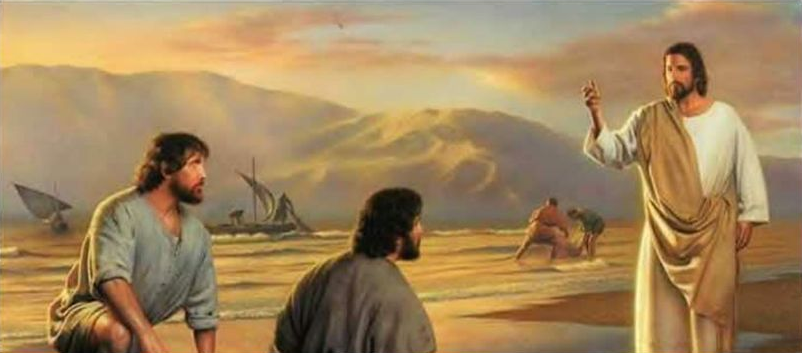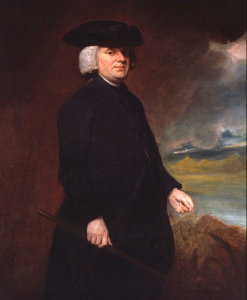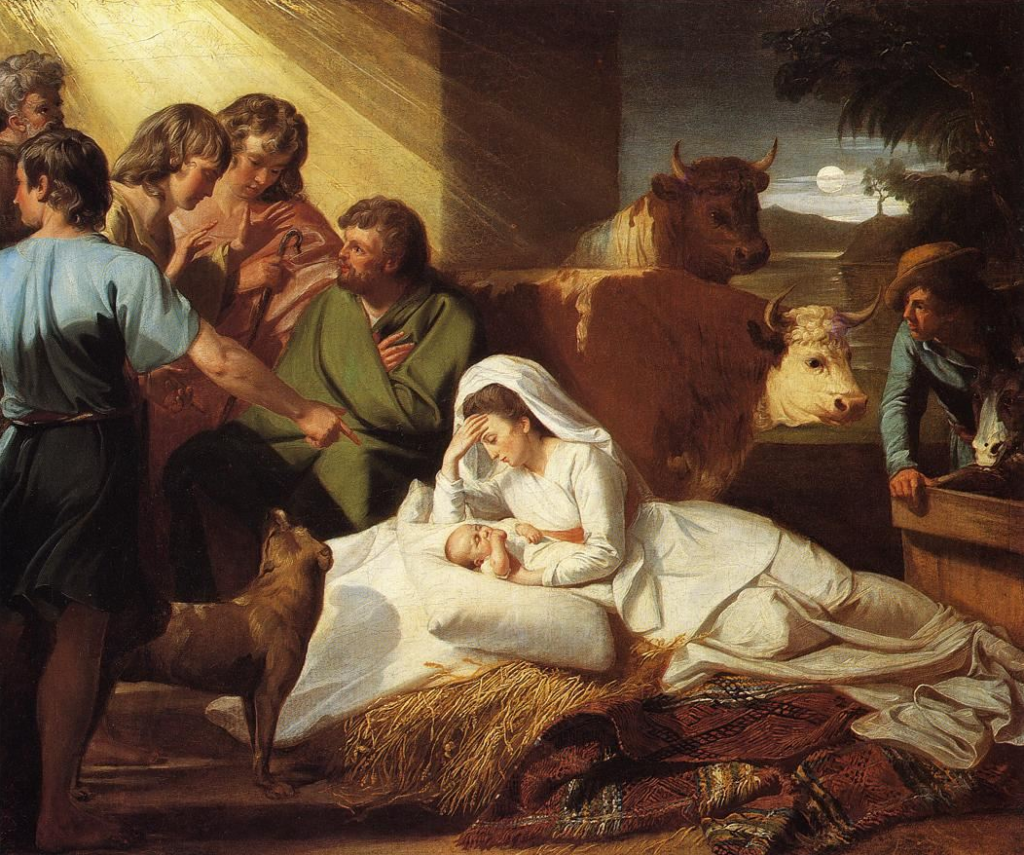
Editor’s note: The following is extracted from Sermons on Various Subjects, by William Paley (published 1825).
“Art thou he that should come, or do we look for another?”
Matthew XI. 3.
The Advent of Jesus Christ into the world, which the order of our public service proposes at this season to our thoughts, the appearance he made, and the character he assumed, compared with the circumstances and expectations of the age and country in which he lived, contain attestations to the truth of the evangelical history which I shall make it my business, as it will not be unsuitable to the occasion, to lay before you; and suggest reflections which will serve, both to confirm the truth of our religion, and to explain some points and passages of the New Testament which are well deserving of observation.
It is clearly to be collected from Scripture, that about the time of our Lord’s coming, some great person, who was to be called Messiah or Christ, by the Jews, was expected to appear amongst them, who also would prove a mighty chief and conqueror; and by the aid, it should seem, of supernatural powers, not only deliver the Jewish nation from the subjection into which they had been brought to the Roman government, but place that nation and himself at the head of them, in the highest condition of prosperity, and in possession of the universal empire of the world. Traces of this opinion, both of the coming of this extraordinary person, and of what he was to do when he did come, are dispersed in various parts of the New Testament :—“Art thou he that should come, or do we look for another ?”—“When Christ cometh, will he do more (or do more miracles) than this man doeth?” “I know,” saith the woman of Samaria, “that Messias cometh; when Christ cometh, no man knoweth whence he is: tell us whether thou be Christ or no.” Herod demanded of the wise men where Christ should be born. It was revealed to Simeon that he should not die before he had seen Christ. “Shall Christ come out of Galilee?” “Hath not the Scripture said that Christ cometh of the seed of David?” “We know that Christ abideth for ever.” “Men mused in their hearts of John, whether he was the Christ.” From these, and some other similar expressions, it is manifest that there was a previous and prevailing expectation that an extraordinary person, who was to be called Christ, or the Messiah, was at that time to appear.
Then as to the second point, what he was to do when he came: “We trusted it had been he,” said his two disciples, “who should have saved Israel.” And again, upon his appearance to them after his resurrection, “Wilt thou at this time,” they asked him, “restore again the kingdom to Israel?” And this notion of theirs, that he was to set up a kingdom upon earth, and become a mighty prince and conqueror in the world, is proved by, and accounts for, a great number of incidents recorded in the Gospels.
It was this that alarmed Herod so much when he heard reports of the miraculous birth. Herod then possessed the kingdom of Judea. Now he, together with the other Jews, expected the Christ which should appear would become a king, by conquering and taking Herod’s kingdom from him; and this apprehension urged him to the desperate expedient of destroying all the children in Bethlehem who were about the age that agreed with the supernatural circumstances that had been talked of. Had Herod looked for no more than a moral teacher, a spiritual ruler, he would have had nothing to fear. This opinion likewise accounts for their attempting to make him a king, when they were convinced by the miracle of the loaves and fishes, “that he was, of a truth, that prophet that should come into the world,” John vi. 15. And also for their receiving him with the pomp and ceremony of an earthly prince when he entered into Jerusalem, cutting down branches, and spreading their garments upon the road, and crying, “blessed be the king that cometh in the name of the Lord.”
This same reason also accounts for the sudden and seemingly strange revolution in the sentiments of the people concerning him. Those who received him with much acclamation, and would not be restrained by the rules from paying him the greatest honours, in a few days afterwards we find crying out that he should be crucified. The case was, when they introduced him to Jerusalem, they supposed that he should forthwith show and make himself, what they had no doubt Christ was to be, a great and mighty conqueror; conquering, probably, by some supernatural assistance, all who opposed him, and delivering his own nation from servitude and subjection to power and glory. When nothing of this came to pass, the disappointment provoked them, and they were as eager to punish him as they were before to acknowledge him for their deliverer. This earthly kingdom was what the two sons of Zebedee had in view when they prevailed upon their mother to ask him that they might sit, one at his right hand and the other at his left; that is, be both chief men under him in his kingdom. And this we see was also the source of the frequent strifes and disputings amongst them, who should be greatest in that expected promotion to power and glory. Lastly, this was the cause that they could never believe, nor so much as comprehend, the many notices he gave them of his approaching crucifixion, because all idea of his being put to death like a malefactor was absolutely inconsistent with the motions which they and all the Jews firmly maintained, that he was to be king him self, and a deliverer of the Jewish nation.
When he told them, upon their going up to Jerusalem, that he should be delivered unto the Gentiles, mocked, spitefully intreated, spitted on, and that they should scourge him and put him to death; we read that they understood none of these things, and the saying was hid from them, neither knew they the things which were spoken. And in confirmation of what has been said, I have only to remark, that the Jews at that day expected both a Messiah to appear, and that, when he should appear, he would make them masters of their own land again, and of the world.
Such, therefore, were the opinions and expectations then actually prevailing amongst the Jewish people. Now what I contend for is, that had Jesus, in professing himself, as he did, to be the king of the Jews, been either an impostor or enthusiast, or any other (which he must have been, if the Christian religion be not true), he might have founded his pretensions on any other thing than truth; he would necessarily have fallen in with the established opinion of the country, and produced himself in the character which they expected. Suppose he was an impostor, and had a scheme of taking advantage of the popular expectation, to impose himself upon the Jews for the great person whose appearance they were looking for, it was certainly his business to have framed his account and pretensions agreeably to those expectations.
Had he been an enthusiast whose enthusiasm, or madness, if you choose to call it so, had been so far infected with the popular phrensy as to imagine itself to be the person promised and expected, then such enthusiasm must at the same time have unavoidably led him to prove himself to be such an one, and to be and to do what these expectations pointed out. And what is a better proof than any reasonings, the fact was so. All the false Christs, all the pretended Messiahs, of which there have been some hundreds, have to a man given themselves out to be the destined deliverers of the Jewish nation, and improvers of the world. We read in the Acts of the Apostles of Theudas and Judas, who, before the days of the Apostles, had drawn much people after them. Josephus, the famous Jewish historian, mentions only nine by name, and multitudes of others whom he does not name conformably with our Saviour’s prediction: “that there should arise false Christs, false prophets, and deceive many.” Some of these might be impostors whom the expectations of the times and consequent eagerness to listen to such pretences called forth; others might be enthusiasts, whose disturbed imagination caught the contagion from the public throng. But both the one and the other, expectants and enthusiasts, they who adapted these things to the received prejudices of the age, boasted and professed to be what they knew their followers wished for, or what they and every one expected.
Now why Christ did not go along with the rest who have called themselves Messiahs, if he was like them, it will be difficult to say. But where, it will be asked, did our Saviour in fact differ or depart from the common and received notion of what the Messiah was to be? This remains to be shown.
Now the difference consists in this: that whereas the Messiah, according to the Jewish notion, was to be in his nature a mere man, and like all other men, but in his condition in the world exalted to summits of honour and grandeur above the kings and princes of this world; he, on the contrary, describes himself, and is described by his followers, as low and mean in his outward visible condition, but in his nature very different from the whole race of mankind.
First; I say that the Jewish Messiah was, in their expectation, to be a mere man. The Jews did not suppose Moses himself to be anything more; nor is there any trace that they had a conception of anything more in the Messiah. None of the false Messiahs set up for anything different as to their nature from an ordinary man. The Jews themselves were at a loss to understand those expressions of our Saviour, by which he intended to intimate the distinction and superiority of his own nature. This was so little thought of, that they were unable to resolve the difficulty he proposed to them: “If Christ be David’s son, how calleth he him the Lord?”
But in his condition their Messiah is to be exalted to superior power and dignity; he is to rule and triumph over all the enemies of the Jewish state; he was to restore the kingdom to Israel; he was to sit upon the throne of his father David, and reign over the house of Jacob forever. All these expressions the Jews interpreted and applied literally. The contrary, however, of all this, our Saviour represents his worldly condition, which it evidently was —so mean and low, and humble and contemptible— born in a manger, and of parents of very inferior station—brought up with these parents—appearing, when he did appear, with a few poor fishermen— without name, fortune, or learning—the son of man had not where to lay his head—indebted to the benevolence of a certain Galilean who ministered unto him of his substance. He came, indeed, as he expresses it, to minister to others, and not to be ministered unto himself; and at last, as he all along foretold he should be, was delivered to the malice of the Jews, and to the power of the Roman yoke. He never attempted to shake off the Roman yoke, nor encouraged any such attempts in his followers; on the contrary, he withdrew himself when the populace would have hailed their king. He disclaimed the idea of altering or subverting the civil governments of the world—the very purpose for which the Jewish Messiah was expected—expressly declaring that his kingdom was not of this world, and replying, when he was requested to interfere in a private dispute, “Man, who made me a judge over you?”
Secondly; but if the condition in which our Saviour appeared exceedingly disappointed the Jewish expectation, the nature of which he described himself to be differed as much from what they conceived or expected. He described himself as a being, though in form and fashion as a mere man, yet in reality, and in his nature, far transcending the whole human race—far, inasmuch as these are but creatures of a birth; “Dust thou art, and to dust shalt thou return.” He was from the beginning, —“before Abraham;”—possessed glory with the Father before the world was. “He came forth from the Father, and came into the world, as he left the world, and went to the Father.” “He came down from heaven, even as he ascended up to heaven.”
Again; we believe that there are orders of creation in the universe much above us, as much, at least, as we are above the brute creation. He was elevated far beyond all these, a “being so much better than these, as he hath by inheritance obtained a more excellent name than they,”—for unto which of the angels, said he, at any time, “thou art my Son, this day have I begotten thee?”
Again; whereas no man hath seen God at any time: he was with the Father, in the bosom of the Father; he spake that which he had seen with the Father—the Father loved him, and showed him all things.
Again; he was next and dearest to his Father, above and beyond all creatures: he was not only the first born of every creature, but of all others “the only begotten of the Father;” which phrase must needs denote a relation, unknown, it is true, and unintelligible to us, but of peculiar value to him, and well understood. He was appointed also to be judge of the quick and the dead; “for the Father judgeth no man, but hath committed all judgement unto the Son.” “It is he,” saith Saint Peter, “which was ordained of God to be the judge of the quick and dead.” “We shall all stand,” Saint Paul assures us, “before the judgement-seat of Christ.”
Lastly; he was invested by the Father with power to raise us up, to recall us to life at the last day. “For as the Father hath life in himself, so hath he given to the Son to have life in himself; i.e. to have the same power over life.” “And this is the Father’s will which hath sent me, that of all which he hath given me I should lose nothing, but should raise them up at the last day.” “I am the resurrection and the life; as in Adam all die, so in Christ shall all be made alive.” It seems by this, not only figuratively, but literally true, that through the sin of Adam human nature became mortal. By the efficacy and power of Christ, the same nature is made capable of a restoration to life. “It is he,” St. Paul assures us, “who is to change our vile body, that it may be like his glorious body.”
Now these several particulars put together compose a character, or more properly speaking, a nature, not only different from any thing the Jews looked for from the Messiah, and in many particulars the reverse of it; but it is entirely, absolutely, and truly original. There was no example that could suggest it, no precedent to authorise it.
The next natural, and as I have argued already, not at all improbable, supposition, had he been guided by any thing else than truth, was, that he would be seen just what the Jews expected the Messiah should be seen; that these expectations had suggested the thought, and were to be the foundation of his claims, and the means of success.
But had our Saviour presented himself as a public and better instructor of mankind in his day, he would have had examples of this in the old philosophers. Had he assumed the character of a Jew, to the Jews he would have been a second Moses. Had he appeared an inspired prophet, instances of such had been of old frequent among the Jews.
But why he should not only depart from the established persuasion of his own country, and of all the world, concerning the Messiah who was expected, but assume pretensions different and unforeseen, superior to any of these already mentioned, and without any instance or example to lead to or suggest such a scheme and character, unless he was, as we believe him to be, really and truly what he called himself, it seems impossible to account for.
The character of Christ is single and alone in the history of mankind. If he was an impostor, there never was such lame and useless imposture. If he was an enthusiast, produce an instance of any character made up so well of enthusiasm, so calm, so rational, so sublime.










5